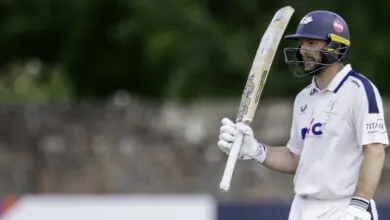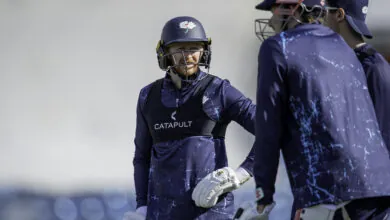By Paul Edwards
EMERALD HEADINGLEY (third day of five) India 78 and 215 for two (Pujara 91*, Sharma 59) need 139 runs to avoid an innings defeat by England, 432 (Root 121, Malan 70, Hameed 60, Burns 61; Shami 4-95)
Test cricket is tough. It is tough for almost all players to earn their selection, tough for them to stay in their country’s team and tough when they come up against opponents of comparable quality. On the rare occasions when five-day cricket is easy it also tends to be easily forgotten, so it is significant that this series against India is developing into one of the most memorable of recent times. The third day of this Headingley Test did not contain the avalanches of deceptively easy wickets or gorged runs that characterised the first two innings but it was even more fiercely contested as India began their long defiant attempt to deny England victory.
That campaign will be composed of many battles and it must stretch deep into Saturday evening or Sunday morning if it is to be successful but by the time play ended on a murky Friday evening in Leeds the tourists were surely happy to have reduced their mammoth 354-run first-innings deficit to 139 for the loss of nothing more grievous than their openers. Somewhat ominously for Joe Root and his bowlers, India’s resistance is being led by Cheteshwar Pujara, once a Yorkshire cricketer, who is unbeaten on 91, and Virat Kohli, who is 45 not out. More ominously, still, both batsmen have made their highest score of the series and are playing with increasing ease. But both know the job is nowhere near done. England’s hopes of making vital breakthroughs may yet rest on their efforts with the second new ball, which becomes available first thing on Saturday. That said, both Moeen Ali and Joe Root were getting plenty of bounce and turn as they wheeled away in Friday’s evening’s gloom.
So this was a day on which just four wickets fell and two of those tumbled in the first ten minutes as Mohammed Shami and Jasprit Bumrah cleaned up England’s tailenders. Having consumed that hors d’oeuvre, the Headingley crowd settled down to the main course that was India’s second innings. They may have hoped and yelled for a collapse to rival that of the first day but secretly they knew things would be not be so easy on a pitch that is offering the seamers no great joy.
It became a day dominated by the Decision Review System. Indeed some spectators may have thought Hawkeye and Ball Tracker had more influence on the outcome than one or two of Root’s bowlers. For example, KL Rahul came within half a second of losing his wicket when he reviewed Richard Kettleborough’s leg before decision just in time and Hawkeye revealed Ollie Robinson’s fine ball to be passing down the leg side. The opener did not take advantage of his reprieve but it took brilliant fielding to remove him. Having made just eight, Rahul pushed forward to Overton’s final ball before lunch but only edged a catch wide to the left of Jonny Bairstow, who dived to complete a superb one-handed catch. It was England’s first breakthrough and also their last until after tea.
The cricket in this second session was as gripping as any we had seen in the match, even if it lacked the obvious appeal of a tumble of wickets or the glory of a Root century. Set against the accuracy of Robinson and Overton, England’s best bowlers, was Rohit Sharma’s classical defensive technique and the increasing confidence of Pujara, who began to punch the ball through midwicket and square leg with the air of a man who knows the worst days of his summer are behind him. The run rate crept up to two an over and the Friday afternoon crowd grew more raucous, as if also anticipating the imminent weekend. Voices supporting India became louder on the Western Terrace and it was pleasing to see that so much support for both sets of players came from younger spectators
An hour into the afternoon session the importance of the DRS was shown once again. Root was a second late in reviewing Kettleborough’s not out call only for the technology to show that Sharma would have been leg before to Ollie Robinson for 39. The opener settled back into a familiar groove and we wondered if this would be the day when he scored his first century outside India. (It would not.) At tea India were 112 for one, a position they would have been accepted had it been offered at the start of their innings. But ten balls after the resumption England’s bowlers gained the breakthrough they craved when Sharma was hit in line on 59 by Robinson and DRS indicated that the ball would have kissed the leg stump. (Little more than an air-kiss, you understand, not a proper snog.) India kept their review but lost their most adhesive batsman. Not for the first time one wondered if captains and their teams have DRS training but such abstract thoughts were pushed to one side by the arrival of Kohli.
James Anderson was off the field when that second wicket fell but was immediately summoned back by Root and returned to the attack as soon as the laws permitted. On this day, though, England’s premier bowler was bested by Kohli, who cover-drove him superbly and, just as importantly, left the balls on fourth stump line that had been causing his downfall in the earlier Tests. Overton and Robinson were more impressive but the nearest England came to a wicket in the shortened evening session was when the Indian batsmen threatened to run themselves out and when Root turned one through Kohli’s gate only to see the ball pass over the top of the stumps. By the close one sensed everyone, not least the umpires, was ready for a rest, a bite to eat and a kip. Battle will be rejoined on Saturday morning.




